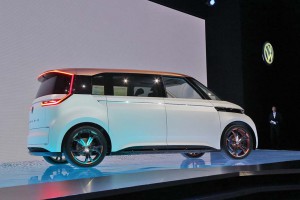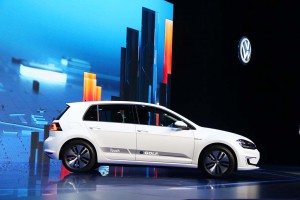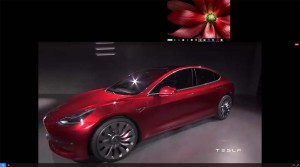
Speculation about VW's commitment developing a viable EV platform may begin by moving the BUDD-e from concept to reality.
The Tesla Model 3, the battery-carmaker’s first affordable long-range EV, is still at least a year away from production, but it’s already facing a fast-growing list of competitors.
That’s set to include Volkswagen, apparently, the maker’s CEO told German news magazine Wirtschafts Woche that VW is planning a new electric vehicle that will deliver between 400 to 600 kilometers per charge, or 248 to 372 miles. That would be even more than what Tesla now delivers from the bigger, and much more expensive Model S.
VW will show a version of the new battery-car at the upcoming Paris Motor Show, according to Diess. It will anchor an aggressive push into electrification by the embattled automaker. Diess previously revealed that Volkswagen plans to launch 30 new EVs by 2025, as well as new hybrids and plug-in models.
The German automaker has taken serious heat over the last year since the U.S. Environmental Protection Agency revealed it had cheated on emissions tests for both its 2.0- and 3.0-liter diesels. That has so far cost it $14.7 billion just as part of a settlement with the U.S. government, and that cost is expected to rise by billions more.
VW officials insist they were already deep into developing their electrification strategy before the scandal broke. But industry analysts believe the maker has ramped up its efforts in a belief that diesel sales have likely peaked, and that battery technology will be needed to meet increasingly stringent global emissions and fuel economy mandates.
With 30 new EVs and other battery-based products, VW believes they could account for as much as a quarter of its global sales in a decade. The carmaker’s various brands are on target to sell around 10 million cars, trucks and crossovers this year.

As part of its restitution proposal, the U.S. government is pushing VW to build EVs at its Tennessee plant.
(EV charging companies demanding watchdog for Volkswagen. For more, Click Here.)
Exactly what VW is bringing to Paris isn’t clear, but the online site Electrek reports that it will be a vehicle about the size of the current Volkswagen Golf, but offering the interior space of the midsize Passat.
That could suggest going with a taller design, something hinted at with the BUDD-e EV concept that was unveiled at the Consumer Electronics Show last January. But there may be a different answer.
Volkswagen plans to develop three all-new platforms for its EV models, a similar approach to what it has done for its more conventional vehicle line-up. It’s all but certain that the maker’s designers and engineers won’t simply mimic platforms like the MQB currently used for the VW Golf, several sources suggest. These new platforms will likely mount the large and heavy batteries needed for a long-range EV in the floor. And they may not need the large engine compartment of today’s automobiles.
(Click Here for more about a study showing plug-in vehicles set for major sales growth.)
That means that some of the space normally found under the hood could be recaptured by the passenger compartment.
Whatever the ultimate design, expectations are that VW’s new, long-range EV could be in production by 2018, or 2019 at the latest. That would put the maker slightly behind General Motors, which will launch production of its new, 200-mile Chevrolet Bolt before the end of this year.

Tesla CEO Elon Musk expects to produce 500,000 Model 3s in 2018, but not everyone is convinced that will happen.
And while Tesla CEO Elon Musk is promising to put the Model 3 into production by the second half of 2017, there are plenty of skeptics. The maker has repeatedly missed its targets, the Model X battery SUV going on sale a full two years late. And when it did come out it was beset by numerous quality problems. Tesla has tried to assure the market it won’t make the same mistakes with the Model 3.
(To see more about Bosch’s involvement in the VW diesel scandal, Click Here.)
Whenever GM, VW and Tesla comes to market, they likely won’t be alone. Most major manufacturers are now working on battery-electric vehicles, many of them also targeting the affordable, long-range segment. That includes Nissan which is due to soon launch a second-generation Leaf. The Japanese maker has hinted it may also push up towards the 200-mile range with that replacement model.
